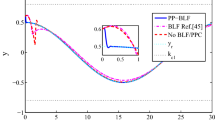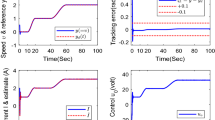Abstract
In this paper, an extended state observer-based adaptive prescribed performance control technique is proposed for a class of nonlinear systems with full-state constraints and uncertainties. An extraordinary feature is that not only the control problem of prescribed performance tracking and full-state constraints are solved simultaneously, but also the parametric uncertainties and disturbances are considered, which will make it difficult to design a stable controller. For this purpose, the extended state observer and adaptive technique are integrated to obtain estimations of disturbances and parameters. Then, based on the combination of prescribed performance and barrier Lyapunov function, a novel backstepping control scheme is developed with feedforward compensation of parameters and disturbances to ensure that the tracking error is kept within a specified prescribed performance bound without violation of full states at all times. Moreover, the boundedness of all signals in the closed-loop system is proved and asymptotic tracking can be realized if the disturbances are time-invariant. Finally, two simulation examples are performed to highlight the efficiency of the proposed approach.















Similar content being viewed by others
References
Krstic, M.: On using least-squares updates without regressor filtering in identification and adaptive control of nonlinear systems. Automatica 45(3), 731–735 (2009)
Yao, B., Tomizukai, M.: Adaptive robust control of SISO nonlinear systems in a semi-strict feedback form. Automatica 33(5), 893–903 (1997)
Wen, C.Y., Zhou, J., Liu, Z.T.: Robust adaptive control of uncertain nonlinear systems in the presence of input saturation and external disturbance. IEEE Trans. Autom. Control 56(7), 1672–1678 (2011)
Shtessel, Y., Taleb, M., Plestan, F.: A novel adaptive-gain supertwisting sliding mode controller: methodology and application. Automatica 48(5), 759–769 (2012)
Chen, B.S., Lee, C.H., Chang, Y.C.: H-infinity tracking design of uncertain nonlinear SISO systems: adaptive fuzzy approach. IEEE Trans. Fuzzy Syst. 4(1), 32–43 (1996)
Guo, B.Z., Wu, Z.H., Zhou, H.C.: Active disturbance rejection control approach to output-feedback stabilization of a class of uncertain nonlinear systems subject to stochastic disturbance. IEEE Trans. Autom. Control 61(6), 1613–1618 (2016)
Deshpande, V.S., Phadke, S.B.: Control of uncertain nonlinear systems using an uncertainty and disturbance estimator. Trans. ASME J. Dyn. Syst., Meas., Control 134(2), 024501 (2012)
Chen, M., Wu, Q.X., Cui, R.X.: Terminal sliding mode tracking control for a class of SISO uncertain nonlinear systems. ISA Trans. 52(2), 198–206 (2013)
Chen, M., Wu, Q.X., Jiang, C.S.: Disturbance-observer-based robust synchronization control of uncertain chaotic systems. Nonlinear Dyn. 70(4), 2421–2432 (2012)
Liu, Y.L., Wang, H., Guo, L.: Composite robust H∞ control for uncertain stochastic nonlinear systems with state delay via a disturbance observer. IEEE Trans. Autom. Control 63(12), 4345–4352 (2018)
Ji, D.H., Jeong, S.C., Park, J.H., Won, S.C.: Robust adaptive backstepping synchronization for a class of uncertain chaotic systems using fuzzy disturbance observer. Nonlinear Dyn. 69(3), 1125–1136 (2012)
Rabiee, H., Ataei, M., Ekramian, M.: Continuous nonsingular terminal sliding mode control based on adaptive sliding mode disturbance observer for uncertain nonlinear systems. Automatica 109, 108515 (2019)
Yao, J.Y., Deng, W.X.: Active disturbance rejection adaptive control of uncertain nonlinear systems: theory and application. Nonlinear Dyn. 89(3), 1611–1624 (2017)
Chen, M., Shao, S.Y., Jiang, B.: Adaptive neural control of uncertain nonlinear systems using disturbance observer. IEEE Trans. Cybern. 47(10), 3110–3123 (2017)
Chen, M., Ge, S.S.: Adaptive neural output feedback control of uncertain nonlinear systems with unknown hysteresis using disturbance observer. IEEE Trans. Ind. Electron. 62(12), 7706–7716 (2015)
Pan, H.H., Sun, W.C., Gao, H.J., Jing, X.J.: Disturbance observer-based adaptive tracking control with actuator saturation and its application. IEEE Trans. Autom. Sci. Eng. 13(2), 868–875 (2016)
Wang, C.L., Lin, Y.: Adaptive dynamic surface control for MIMO nonlinear time-varying systems with prescribed tracking performance. Int. J. Control 88(4), 832–843 (2015)
Wang, Y.Y., Hu, J.B., Li, J., Liu, B.Q.: Improved prescribed performance control for nonaffine pure-feedback systems with input saturation. Int. J. Robust Nonlinear Control 29, 1769–1788 (2019)
Bechlioulis, C.P., Rovithakis, G.A.: Robust adaptive control of feedback linearizable MIMO nonlinear systems with prescribed performance. IEEE Trans. Autom. Control 53(9), 2090–2099 (2008)
Wang, S.B., Na, J., Ren, X.M.: RISE-based asymptotic prescribed performance tracking control of nonlinear servo mechanisms. IEEE Trans. Syst., Man, Cybern., Syst. 48(12), 2359–2370 (2018)
Na, J., Chen, Q., Ren, X.M., Guo, Y.: Adaptive prescribed performance motion control of servo mechanisms with friction compensation. IEEE Trans. Ind. Electron. 61(1), 486–494 (2014)
Wang, S.B., Ren, X.M., Na, J., Zeng, T.Y.: Extended-state-observer-based funnel control for nonlinear servomechanisms with prescribed tracking performance. IEEE Trans. Autom. Sci. Eng. 14(1), 98–108 (2017)
Zhu, Y.K., Qiao, J.Z., Guo, L.: Adaptive sliding mode disturbance observer-based composite control with prescribed performance of space manipulators for target capturing. IEEE Trans. Ind. Electron. 66(3), 1973–1983 (2019)
Chen, L.S., Wang, Q.: Prescribed performance-barrier Lyapunov function for the adaptive control of unknown pure-feedback systems with full-state constraints. Nonlinear Dyn. 95, 2443–2459 (2019)
Sun, T.R., Pan, Y.P.: Robust adaptive control for prescribed performance tracking of constrained uncertain nonlinear systems. J. Frank. Inst. 356, 18–30 (2019)
Han, S.I., Lee, J.M.: Improved prescribed performance constraint control for a strict feedback non-linear dynamic system. IET Control Theory Appl. 7(14), 1818–1827 (2013)
Zhao, K., Song, Y.D., Ma, T.D., He, L.: Prescribed performance control of uncertain Euler–Lagrange systems subject to full-state constraints. IEEE Trans. Neural Netw. Learn. Syst. 29(8), 3478–3489 (2018)
Zhang, J.J., Sun, Q.M.: Prescribed performance adaptive neural output feedback dynamic surface control for a class of strict-feedback uncertain nonlinear systems with full state constraints and unmodeled dynamics. Int. J. Robust Nonlinear Control 30(2), 459–483 (2020)
Cheng, J., Park, J.H., Zhao, X.D., Karimi, H.R., Cao, J.D.: Quantized nonstationary filtering of network-based Markov switching RSNSs: a multiple hierarchical structure strategy. IEEE Trans. Autom 65(11), 4816–4823 (2020)
Cheng, J., Huang W. T., Park, J. H., Cao J. D.: A hierarchical structure approach to finite-time filter design for fuzzy Markov switching systems with deception attacks. IEEE Trans. Cybern. https://doi.org/10.1109/TCYB.2021.3049476
Han, J.Q.: From PID to active disturbance rejection control. IEEE Trans. Ind. Electron 56(3), 900–906 (2009)
Tee, K.P., Ren, B., Ge, S.S.: Control of nonlinear systems with time-varying output constraints. Automatica 47(11), 2511–2516 (2011)
Zhao, Z.L., Guo, B.Z.: A novel extended state observer for output tracking of MIMO systems with mismatched uncertainty. IEEE Trans. Autom. Control 63(1), 211–218 (2018)
Guo, B.Z., Wu, Z.H.: Output tracking for a class of nonlinear systems with mismatched uncertainties by active disturbance rejection control. Syst. Control Lett. 100, 21–31 (2017)
Chen, S., Chen, Z.X.: On active disturbance rejection control for a class of uncertain systems with measurement uncertainty. IEEE Trans. Ind. Electron 68(2), 1475–1485 (2021)
Tee, K.P., Ge, S.S., Tay, E.H.: Barrier Lyapunov functions for the control of output-constrained nonlinear systems. Automatica 45(4), 918–927 (2009)
Kostarigka, A.K., Doulgeri, Z., Rovithakis, G.A.: Prescribed performance tracking for flexible joint robots with unknown dynamics and variable elasticity. Automatica 49, 1137–1147 (2013)
Cheng, J., Park, J.H., Cao, J.D., Qi, W.H.: A hidden mode observation approach to finite-time SOFC of Markovian switching systems with quantization. Nonlinear Dyn. 100(1), 509–521 (2020)
Wang, C.C., Yang, G.H.: Observer-based adaptive prescribed performance tracking control for nonlinear systems with unknown control direction and input saturation. Neurocomputing 284, 17–26 (2018)
Zong, Q., Zhao, Z.S., Zhang, J.: Higher order sliding mode control with self-tuning law based on integral sliding mode. IET Control Theory Appl. 4(7), 1282–1289 (2010)
Zuo, Z.Y.: Non-singular fixed-time terminal sliding mode control of non-linear systems. IET Control Theory Appl. 9(4), 545–552 (2015)
Ye, D., Cai, Y., Yang, H., Zhao, X.: Adaptive neural-based control for non-strict feedback systems with full-state constraints and unmodeled dynamics. Nonlinear Dyn. 97, 715–732 (2019)
Acknowledgements
This work was supported in part by the University Synergy Innovation Program of Anhui Province under Grant GXXT-2019-048.
Author information
Authors and Affiliations
Corresponding author
Ethics declarations
Conflict of interest
The authors declare that they have no conflict of interest.
Additional information
Publisher's Note
Springer Nature remains neutral with regard to jurisdictional claims in published maps and institutional affiliations.
Appendices
Appendix 1
Proof of Theorem 1. If the disturbances di, i = 1,..., n, are time-invariant, the following positive definite Lyapunov function is defined with xei = di in this case
Differentiating Vn, substituting (5) into it yields
As the matrix A is Hurwitz,\(A^{T} P + PA = - 2I\) is established, noting (23)–(26), we have
Utilizing the Young’s inequality, we obtain
Substituting (28) and (44) into (43), then we have
According to Lyapunov’s theorem, Va is uniformly ultimately bounded; thus, errors zi, \(\tilde{\theta }\), and \(\tilde{\varepsilon }\) are bounded. This further guarantees the boundedness of e1. Moreover, the adaptive parameters \(\hat{\theta }\) and \(\hat{x}_{ei}\) are all bounded. As x1 = e(t) + x1d(t), \(z_{1} = e\left( t \right)/\rho \left( t \right)\), \(\left| {z_{1} } \right| \le 1\) with Assumption 2 and (8), we have \(\left| {x_{1} } \right| \le c_{1}\), and x1 is bounded. α1 in (12) is a function of x1, z1,\(\hat{\theta }\),\(\dot{x}_{1d}\) and \(\hat{x}_{e1}\). Since the boundedness of x1, z1, \(\hat{\theta }\), \(\dot{x}_{1d}\) and \(\hat{x}_{e1}\), α1 is bounded. As \(\left| {x_{2} } \right| \le \left| {\alpha_{1} } \right|_{\max } + \left| {z_{2} } \right|\) and \(\left| {z_{2} } \right| \le L_{2}\), we obtain \(x_{2} \le c_{2}\) and α2 is bounded. Similarly,\(\left| {x_{i + 1} } \right|\), αi, i = 3, …, n-1 and the control input u are bounded. Consequently, all signals in the closed-loop system are bounded, prescribed performance tracking is obtained and full states are ensured to remain in the constrained field.
Appendix 2
Proof of Theorem 2. If the disturbances di, i = 1,..., n, are time-variant, xei = \(d_{i} \left( {\overline{x}_{i} ,t} \right) + \tilde{\theta }^{T} \varphi_{i} \left( {\overline{x}_{i} } \right)\). With (6), differentiating Vb defined in (29), we have
As \(A^{T} P + PA = - 2I\), noting (23), (25) and (28), we have
As \(\log \frac{{L_{j}^{2} }}{{L_{j}^{2} - z_{j}^{2} }} \le \frac{{z_{j}^{2} }}{{L_{j}^{2} - z_{j}^{2} }}\) in the interval zj < Lj [42], then
which leads to (30). Similar to the proof of Theorem 1, all signals in the closed-loop system are also bounded and prescribed performance tracking is obtained without violation of constraints of the full states.
Rights and permissions
About this article
Cite this article
Xu, Z., Xie, N., Shen, H. et al. Extended state observer-based adaptive prescribed performance control for a class of nonlinear systems with full-state constraints and uncertainties. Nonlinear Dyn 105, 345–358 (2021). https://doi.org/10.1007/s11071-021-06564-3
Received:
Accepted:
Published:
Issue Date:
DOI: https://doi.org/10.1007/s11071-021-06564-3




